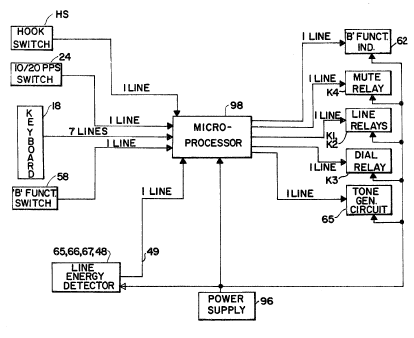
Rates Technology v. Nortel Networks (Fed. Cir. 2005).
by Bradley Crawford
The defendant, Nortel, was sued for patent infringement but raised the affirmative defense of lack of personal jurisdiction. Later, the defendant filed a permissive counterclaim. The plaintiff subsequently asserted that Nortel waived its lack of personal jurisdiction defense when it filed its permissive counterclaim. The district court disagreed. It ruled that the defendant’s filing a permissive counterclaim did not waive the lack of personal jurisdiction defense. It also ruled that it lacked personal jurisdiction over the defendant and dismissed the case.
The long summary:
Rates Technology Inc. (“RTI”) sued Nortel Networks Corporation (“NNC”) for infringing U.S. Patent No. 4,209,668 (‘668 patent.) In its complaint, RTI asserted that NNC was the successor in interest to a company that infringed the ‘668 patent. NNC defended by raising the affirmative defense of lack of personal jurisdiction. NNC also counterclaimed for declaratory judgment of noninfringement, invalidity, and unenforceability, as well as unfair competition and patent misuse.
RTI then filed a first amended complaint and NNC responded with a first amended answer that realleged the lack of personal jurisdiction and sought a declaration of noninfringement of two other U.S. Patent Nos. 5,425,085 (‘085 patent) and 5,519,769 (‘769 patent) owned by RTI.
Before discovery, in January, NNC moved to dismiss RTI’s complaint for lack of personal jurisdiction under Fed. R. Civ. P. 12(b)(2). In support of its motion, NNC filed a declaration stating that NNC was a Canadian holding company that did not make manufacture, use, sell, or offer for sale products in the U.S; NNC was not a successor in interest to any company that manufactured, used, sold, or offered for sale any allegedly infringing products; NNC owned Nortel Networks Limited, which wholly owned Nortel Networks Inc. (NNI); and all operations in the U.S. were conducted by its subsidiary NNI.
In February, during a Fed. R. Civ. P. 30(b)(6) deposition, RTI obtained testimony that 1) NNC was a Canadian holding company that never manufactured or sold any products, 2) NNC’s predecessor in interest did not manufacture or sell any products, and 3) NNI may have manufactured or sold some of the accused products. RTI did not depose any other NNI employees, nor did it join NNI to the law suit. Discovery continued into September.
In October, the district court stayed all proceedings and set oral arguments on NNC’s motion to dismiss for lack of personal jurisdiction. The district court stressed that RTI had failed to establish any evidence contradicting NNC’s Rule 12(b)(2) motion, but said that it would allow RTI to submit any evidence obtained in discovery supporting its allegation of personal jurisdiction over NNC. RTI filed a supplemental opposition to NNC’s motion, realleging that NNC was a successor in interest to a company that engaged in infringing activities, and arguing that NNC waived its jurisdictional objections by filing permissive counterclaims against RTI in its answer.
The district ruled that NNC did not waive its personal jurisdiction defense, as it had properly raised its jurisdictional objections at the beginning of the litigation. The district court further ruled that RTI’s failure to 1) allege that NNI was a “mere department” of NNC, or 2) properly name and serve NNI as a defendant made the successor status of NNI irrelevant.
On appeal, amongst other arguments, RTI argued that the district court improperly dismissed its amended complaint because NNC submitted to personal jurisdiction of the district court when it filed its permissive counterclaims for declaratory judgment of noninfringement of the ‘085 patent and the ‘769 patent. NNC countered that no jurisdictional waiver occurred because under the Federal Rules of Civil Procedure, to preserve a defense of lack of personal jurisdiction, the defendant need only assert its lack of personal jurisdiction defense in its first responsive filing, which NNC did.
In its decision, the Federal Circuit applied its own law to the personal jurisdiction question. It then cited Fed. R. Civ. P. 12(h)(1), which establishes that “[a] defense of lack of jurisdiction over the person, …is waived…if it is neither made by motion under this rule nor included in a responsive pleading or amendment thereof permitted by Rule 15(a) to be made as a matter of course.”
The Federal Circuit then noted that NNC timely objected to RTI’s assertion of personal jurisdiction and that RTI did not argue to the contrary. Consequently, NNC fell within the ambit of Fed. R. Civ. P. 12(h)(1). The Federal Circuit then held “filing a counterclaim, compulsory or permissive, cannot waive a party’s objections to personal jurisdiction, so long as the requirements of Rule 12(h)(1) are satisfied. Indeed, holding to the contrary would effectively eliminate the unqualified right provided by Rule 12(b) of raising jurisdictional defenses either by motion or answer.” The Federal Circuit then affirmed the district court’s personal jurisdiction ruling in favor of NNC.
Bradley W. Crawford is a attorney at MBHB LLP focusing his efforts on patent litigation, prosecution, and counseling. Prior to joining MBHB, Mr. Crawford worked in the areas of synthetic organic chemistry as well as medicinal chemistry.